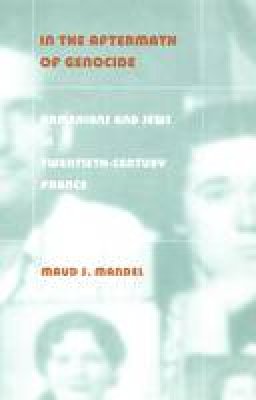8%OFF

Stock image for illustration purposes only - book cover, edition or condition may vary.
In the Aftermath of Genocide: Armenians and Jews in Twentieth-Century France
Maud S. Mandel
€ 36.99
€ 33.95
FREE Delivery in Ireland
Description for In the Aftermath of Genocide: Armenians and Jews in Twentieth-Century France
Paperback. France is the only Western European nation home to substantial numbers of survivors of the World War I and World War II genocides. This title offers a comparison of the country's Armenian and Jewish survivor communities. Num Pages: 336 pages. BIC Classification: 3JJ; HBJD; HBTZ; JFSL. Category: (P) Professional & Vocational. Dimension: 5969 x 3963 x 20. Weight in Grams: 476.
France is the only Western European nation home to substantial numbers of survivors of the World War I and World War II genocides. In the Aftermath of Genocide offers a unique comparison of the country's Armenian and Jewish survivor communities. By demonstrating how-in spite of significant differences between these two populations-striking similarities emerge in the ways each responded to genocide, Maud S. Mandel illuminates the impact of the nation-state on ethnic and religious minorities in twentieth-century Europe and provides a valuable theoretical framework for considering issues of transnational identity. Investigating each community's response to its violent past, Mandel reflects on how shifts in ethnic, religious, and national affiliations were influenced by that group's recent history. The book examines these issues in the context of France's long commitment to a politics of integration and homogenization-a politics geared toward the establishment of equal rights and legal status for all citizens, but not toward the accommodation of cultural diversity.In the Aftermath of Genocide reveals that Armenian and Jewish survivors rarely sought to shed the obvious symbols of their ethnic and religious identities. Mandel shows that following the 1915 genocide and the Holocaust, these communities, if anything, seemed increasingly willing to mobilize in their own self-defense and thereby call attention to their distinctiveness. Most Armenian and Jewish survivors were neither prepared to give up their minority status nor willing to migrate to their national homelands of Armenia and Israel. In the Aftermath of Genocide suggests that the consolidation of the nation-state system in twentieth-century Europe led survivors of genocide to fashion identities for themselves as ethnic minorities despite the dangers implicit in that status.
Product Details
Publisher
Duke University Press
Format
Paperback
Publication date
2003
Condition
New
Weight
475g
Number of Pages
336
Place of Publication
North Carolina, United States
ISBN
9780822331216
SKU
V9780822331216
Shipping Time
Usually ships in 7 to 11 working days
Ref
99-1
About Maud S. Mandel
Maud S. Mandel is Dorot Assistant Professor of Judaic Studies and Assistant Professor of History at Brown University.
Reviews for In the Aftermath of Genocide: Armenians and Jews in Twentieth-Century France
This extraordinarily well-conceived book enriches scholarship on French Armenians and Jews by exploring how genocide shaped communal life and the processes by which national and ethnic identities converged in twentieth-century France. -Leslie P. Moch, author of Moving Europeans: Migration in Western Europe since 1650 France is a perfect setting for this exciting comparative study. Not only is it one of the places where both Armenians and Jews settled or re-settled after displacement, but it is a country which, due to its long history as a nation-state and its constantly reaffirmed `republican' ideology, offers a particularly interesting case for an analysis of transnationalism-as-lived. -Nancy L. Green, author of Ready-to-Wear and Ready-to-Work: A Century of Industry and Immigrants in Paris and New York
